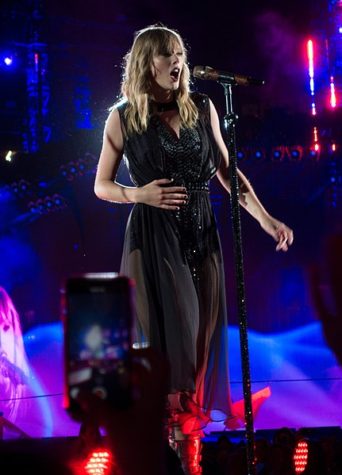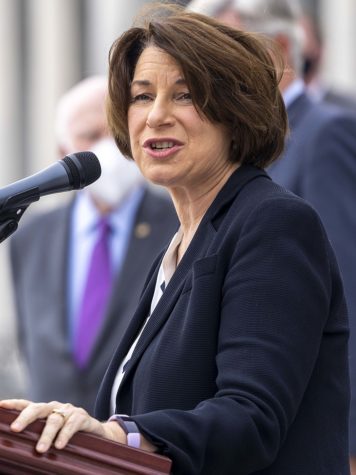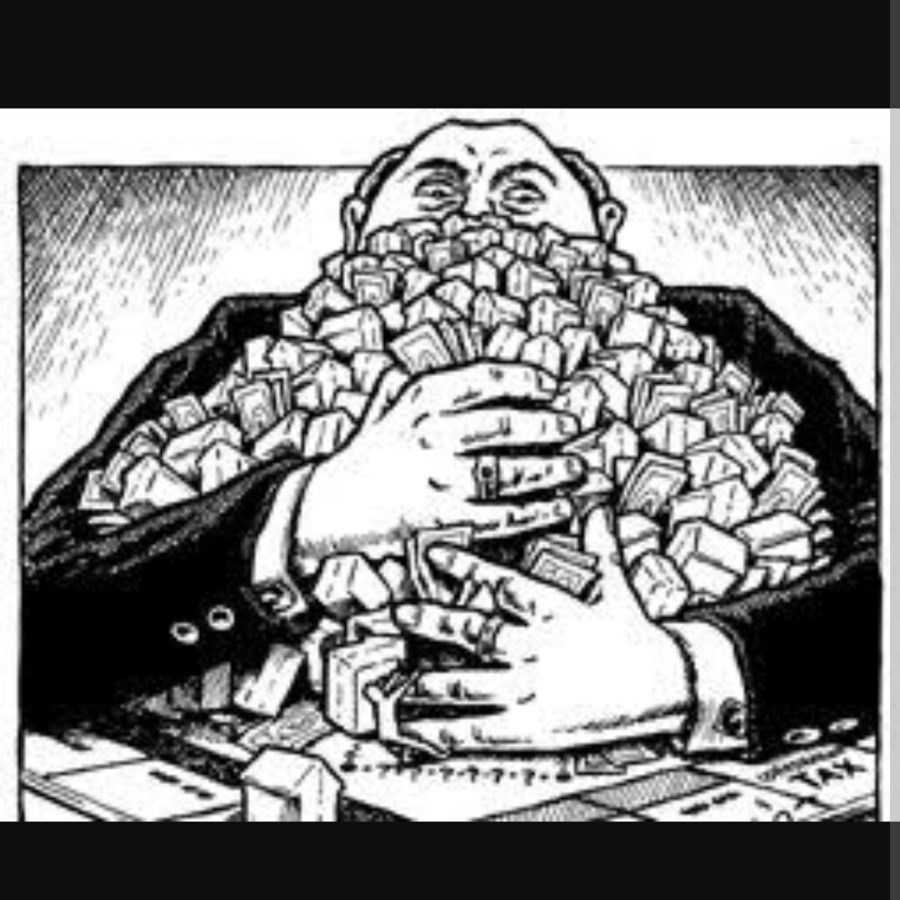Ticketmaster: A Modern Day Monopoly
Since its merger with LiveNation, Ticketmaster has become the biggest provider of live event tickets. Ticketmaster is known for its system, fees and prices and has recently been put in the spotlight by angry customers and government officials.
Dickson t j, CC BY-SA 4.0
A monopoly means “exclusive possession or control.”
You roll the dice.
You hold your breath and impatiently await the numbers that will determine your future.
You pray for an opportunity to invest and grow your fortune and collection of real estate, but deep down you know there is a larger force at play. At almost every turn they are waiting to claim your money and bleed you dry. It doesn’t matter what you buy or where you go, their power is constantly growing.
And that’s how you know they won; they have built a monopoly.
When many people hear the word monopoly they associate it with the game that ensued a family fight. In reality the game is an imitation of a real life economic issue.
The term monopoly is employed when describing a company that has exclusive control of a market. This means that there will only be a single seller for a certain type of product or service. Businesses like these make it almost impossible for smaller companies to compete, limiting the diversity in their respective market, and often raising the prices that consumers must pay.
Monopolies were prevalent in the U.S. in the late 19th century. Some of the biggest names in the game were Standard Oil and Carnegie Steel Company. These companies had so much control over their individual markets that the government began to institute antitrust laws. Antitrust laws are federal laws meant to regulate businesses and promote competition by breaking apart monopolies and preventing their formation.
However, in the last few decades of the 20th century the government has become looser in its enforcement of antitrust laws. This has allowed the concentration of power and dominance of the market in many sectors of the economy. A modern example of monopolies can be evident in the market of ticketing.
Today, one of the largest companies in the ticket market is Ticketmaster. Founded in 1976, Ticketmaster originally licensed computer programs and sold hardware for ticketing systems. Under CEO Fred Rosen, Ticketmaster moved to Los Angeles to be closer to the live entertainment industry. There they established contracts with popular venues and went international. By 1991 the company was able to acquire their rival, Ticketron, taking the lead in the ticketing market.

Ticketmaster was then purchased by InterActiveCorp, an American holding company. Eventually Ticketmaster was spun into its own company. Ticketmaster was able to merge with CitySearch, later acquiring several other ticketing systems and Front Line Management, an artist management firm that housed many stars.
While continuously absorbing businesses, Ticketmaster additionally lobbied in several states to enact laws that would limit the ticket resale market. Then president of the company, Sean Moriarty, claimed that this was to reduce scalpers and counterfeit tickets, but these laws posed harm to Ticketmaster’s competition.
In 2009, Ticketmaster began to merge with Live Nation, an event promoter, to create Live Nation Entertainment. One year after the agreement, the merger deal was officially cleared by the U.S. Department of Justice (DOJ) under the condition that Ticketmaster sold its daughter company, Paciolan, and licensed its software to competitors. The company was also put under provisions for 10 years to prevent them from targeting venues that partnered with other firms.

Despite being approved by the DOJ, the Live Nation Entertainment merger faced major backlash from both consumers and performers. Singer Bruce Springsteen was one of the most notable artists to speak up against the original merger back in 2009. During the sale for his Working on a Dream tour, Ticketmaster redirected fans looking to buy tickets to a secondary site, TicketsNow that was up-selling tickets despite seats being available at face value. In a letter to his fans, Springsteen expressed his disapproval of Ticketmaster’s actions and made comments on the possibility of the company merging with Live Nation “thereby returning us to a near monopoly situation in music ticketing.”
Even prior to the merger, bands such as Pearl Jam had taken an anti-Ticketmaster stance. During their tours in the early 1990s, Pearl Jam decided to only perform in venues where tickets could be capped at $18, and service fees would not exceed $2. At the time, Ticketmaster’s fees ranged from around $4-8, which meant Pearl Jam was unwilling to partner with them. In response, the company allegedly manipulated promoters to boycott the band.
After this incident, the band denounced Ticketmaster as a concert ticketing monopoly, leading to an investigation by the Department of Justice and hearings being conducted by Congress. A Pearl Jam Bill was even formed that would require events to clearly print all service charges, but both the bill and the investigation died by 1995.
In 2019, the company’s initial provision of 10 years was extended another 5 years due to violations of the terms of their agreement with the Department of Justice. It was found that Live Nation forced venues into signing deals with Ticketmaster by threatening to withhold tours under the company’s control. This violated one of the key provisions in the initial decree. Many critics argued that the violation alone should have been enough to encourage the breaking up of the companies instead of merely penalizing them.
Although Live Nation denies all claims of these alleged threats, the fact remains that Ticketmaster controls the ticketing for over 70% of major venues. Due to this, many venues face the threat of losing businesses if they don’t pair with Ticketmaster.
Due to the power they have over the industry, Ticketmaster is able to mark up the prices of their products and charge unreasonably large fees without any repercussions. On some occasions, such as a Backstreet Boys concert in Charlotte, North Carolina, the ticket fees were almost 50% of the original ticket price.
In November of 2022, President Joe Biden spoke out against the rise in fees across industries on his Twitter account, posting “It isn’t right. My Administration is taking actions to reduce or eliminate these surprise fees.” Biden claims that the Federal Trade Commission has begun to crack down “on unfair and deceptive fees across all industries,” especially those that are hidden from customers, making them impossible to avoid.

Recently, a spike in anti-Ticketmaster sentiments was caused by the sale for superstar Taylor Swift’s Eras Tour in November of 2022. The Eras tour was predicted to be one of the highest selling tours in history, being Swift’s comeback after the 2018 Reputation world tour, the third highest grossing female tour in history. Ticketmaster reported that over 14 million users showed up to their site on the day of the presale, despite claiming they only released 1.5 million access codes to fans. Fans were outraged about the long wait, glitchy system, lack of tickets and immediate rise in costs.
Not only were fans stuck in line for hours on end, tickets jumped up in price due to Ticketmaster’s reselling feature. Ticket prices raised to the ten thousands despite initially costing no more then $900 before fees. These issues were prevalent during both the fan presale and a presale exclusive to Capital One card holders. The debacle was so big that tickets never even went on sale for the general public.
Swift’s fans, commonly referred to as ‘Swifties,’ rallied together to attack the company.
U.S. Representative Alexandria Oscasio-Cortez was one of the many to encourage the backlash on Ticketmaster after the Taylor Swift ticketing fiasco, reminding her fans on Twitter “that Ticketmaster is a monopoly, its merger with LiveNation should never have been approved, and they need to be reigned in. Break them up.”

On January 24th, 2023, the United States Senate Judiciary Committee held a long awaited hearing on Live Nation and their role in the ticketing industry.
During this hearing, senators and other speakers attacked the company, incorporating Swift’s lyrics into their speeches. Senator Richard Blumenthal, for instance, suggested, “that Ticketmaster ought to look in the mirror and say, “I’m the problem, it’s me,” quoting the song ‘Anti-Hero,’ the lead single of Swift’s most recent album.
Senator Amy Klobuchar’s comments at the hearings highlighted exactly what the problem is when she remarked, “This is all the definition of monopoly, Live Nation is so powerful that it doesn’t even need to exert pressure. It doesn’t need to threaten, because people just fall in line.”
It is clear the Ticketmaster and Live Nation have power over the ticketing industry that has gone unregulated for far too long. A merger of this kind should not have been approved by the Department of Justice as it gave Ticketmaster too much control over the ticketing market. The power they wield has allowed them to dominate other competing businesses, manipulate venues and artists, and overcharge customers. Similar to the monopolies before it, such as Standard Oil, Live Nation Entertainment should be dissolved and broken up into separate companies.
“This is all the definition of monopoly, Live Nation is so powerful that it doesn’t even need to exert pressure. It doesn’t need to threaten, because people just fall in line.”
Sophia Markens is a Managing Editor and Social Media Editor for ‘The Science Survey.’ For the past two years, she has been writing and editing for...

